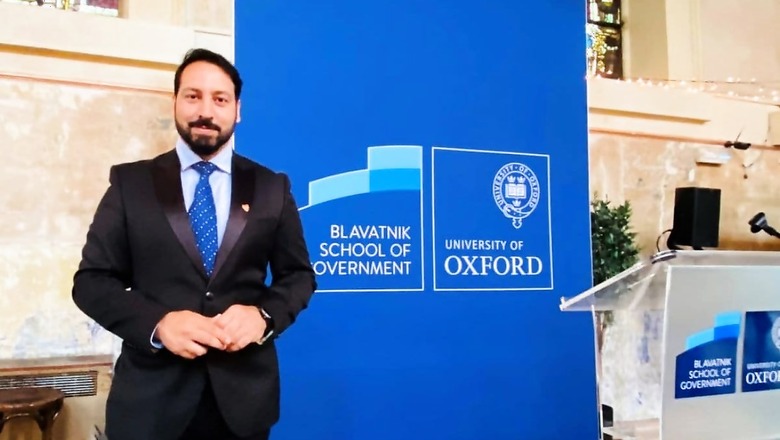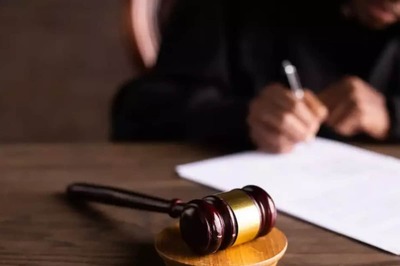
views
Mirza Saaib Beg is the first Kashmiri to bag the prestigious Kofi Annan scholarship at Mansfield College and the Oxford-Weidenfeld-Hoffmann scholarship at Blavatnik School of Government. After the course, he plans to continue his legal work and political advocacy on issues of law, governance and policy in Kashmir. In this interview, he shares how living and studying within Kashmir is fraught with many hurdles that students outside the Valley do not have to engage with.
Edited excerpts from the interview:
1) You are the first Kashmiri to get these scholarships. Why do you think it has taken so long for a Kashmiri to get here?
Kashmir has produced some of the greatest intellects in South Asia. From philosophers like Sir Mohammad Iqbal, poets like Agha Shahid Ali and Rasul Mir to writers like Saadat Hassan Manto, many of the greats in this part of the world have Kashmiri origins. Recently, many Kashmiris have won scholarships like Rhodes and Chevening as well. So, there is no dearth of excellence in Kashmir. Being the first is only ornamental for statistical purposes and not a reflection of the calibre of other aspirants from Kashmir. There are many students who are better qualified than me but do not have the right exposure or information for such applications. This disadvantage is exacerbated by the physical and mental trauma of living in a conflict zone.
The achievements of Kashmiri students are remarkable given the circumstances we have to overcome to succeed. One must be conscious of the fact that living and studying within Kashmir is fraught with many hurdles that students outside Kashmir do not have to engage with. We struggle for the most basic survival as conflict permeates through every aspect of our lives and our students are deprived of a psychologically supportive environment. Even at its most peripheral level, it overshadows free-thinking and affects the mental health of all Kashmiris. There is no way to escape or mitigate the toxic stress we undergo as our rights of dignity, bodily integrity and peace are violated on a regular basis.
As a direct result, the mental space we can devote to applications/exams like this is severely diminished. With educational institutes being shut down for months, internet being frequently cut off, it is hard to get a stable education that puts us at par with applicants from around the world who have no lived experience of conflict. It is easy to feel trapped in this situation because an individual may feel that their existence is inconsequential to the larger conflict. However, such scholarships are in recognition of our excellence, despite all odds. These are not individual achievements but rather an acknowledgment of the collective moral resistance of Kashmiris.
2) Can you also tell us about your family and education background?
My parents are doctors. I grew up with my maternal grandparents in Srinagar. My grandfather, GM Waiz retired as Joint Registrar, Cooperative. He has been one of my biggest mentors and guides throughout my life. He used to teach me English, Urdu, Farsi and Islamic philosophy. I did my schooling from Iqbal Memorial Institute in Bemina, Srinagar. During my school years, I had no access to the internet at home but I was lucky to have good libraries and book shops in Kashmir.
I would save lunch money to buy books from the Sunday market where all kinds of books were available for as little as Rs 10- Rs 30. After clearing the national exam, Common Law Admissions Test (CLAT), for national law universities, I studied law at NALSAR University of Law. In my final year, I was elected president of the student union and upon graduation I was awarded the vice chancellor’s gold medal. As a law student, I participated in various extracurricular activities and interned with various institutions, senior judges and lawyers to hone my understanding of law. I participated in moot court competitions, most notably winning the Bar Council of India scholarship when my team won India’s oldest moot court competition. I was also active in British parliamentary style debating and travelled to Germany for the World Universities Debating Championship- the world’s largest debating tournament. After my studies, I worked for a few years in the legal department of the capital markets regulator and I handled issues concerning legal policy, securities regulation and litigation in the securities appellate tribunal, Bombay High Court and Supreme Court of India.
3) Why did you choose to go for public policy? What are your plans after the course is completed and how do you intend to practice what you learn?
The course offers an inter-disciplinary and distinctive approach to learning about public policy and it trains students to evaluate leadership and governance. Students are taught philosophy, politics, economics and law in addition to applied policy modules. I have an interest in law, politics and philosophy. Oxford has an outstanding history of educating public leaders, including 28 British Prime Ministers and hundreds of leaders and heads of state from around the world including India’s Prime Ministers Manmohan Singh, Indira Gandhi and Pakistan’s Prime Ministers Imran Khan, Benazir Bhutto and her father, Zulfiqar Bhutto. But there is more to good governance than just political leaders and elections. Of course, elections and leaders matter, but the epicentre of good governance lies in legislation and policy making. Elections can be won on empty rhetoric but merely meeting a procedural requirement of holding elections does not result in good governance. After the course, I plan to continue my legal work and political advocacy on issues of law, governance and policy in Kashmir.
4) Every society has a socio-economic disparity, where an elite would have more access to aspire than those who are on the lower level economically. Can you tell us, how would you help create awareness about these opportunities? Is enough being done to create awareness about these opportunities?
Socio-economic disparity is not a natural state of being in a society. It is engineered and designed to benefit some to the detriment of others. It is hard to create sufficient awareness and bridge socio-economic disparity at an individual level. We can leverage our social media and conventional news media to highlight certain success stories but this is far too little to address the concern. In order to address the socio-economic disparity and information asymmetry in society, we need policy intervention at the state level. Not just in Kashmir, but around the world, inequality and wealth gaps are increasing to unprecedented levels. Due to this, the existing and entrenched inequalities are set to worsen.
While the UK is more equal than the USA, it is still one of the most unequal nations in Europe. It is in the interest of the state to address these concerns immediately because this kind of gross inequality can have severe political repercussions. This is one of the reasons for widespread polarisation across the world today. It is not possible to hold together a democratic state if the wealth distribution is undemocratic and the state provides little means for socio-economic mobility of its people.
Due to revolutionary reforms in the 1950s in Kashmir the level of inequality is not as drastic as it is in many parts of India and Pakistan. Despite having endured seven decades of political turmoil, international wars and internal conflict, we have some of the highest indicators of human development across all parameters in this region. However, India and/or Pakistan must not be used as a benchmark of achievement for us. The Kashmiri society is held back from attaining its full potential because we are politically stifled. State policymakers are enmeshed in a centrally managed, Kafkaesque bureaucracy with diktats demanding conformity and silence. The perversity of such governance structures affects all public services – children are deprived of a stable education, law enforcement ignores crimes of the influential and the state claims to provide freedom and development by taking away our liberty and rights. As a result, skilled Kashmiris look for means to escape the stress and misery that is inflicted on those living inside Kashmir. It is for these reasons that I am fiercely motivated to devote my resources and skills at addressing the legal and political issues Kashmir is affected by.
5) I want to know how do you place these aspirations to study at Oxford when residents back home say human rights are being violated?
There is long a legacy of leaders, professionals and political activists from around the world who have followed a similar path to take time to hone their political understanding, organisational skills and networks. Even when British India was under colonial rule and people living in these parts endured the brunt of colonial occupation, Indian and Pakistani freedom fighters like Babasaheb Ambedkar, MA Jinnah, Sir Mohammad Iqbal, Jawaharlal Nehru, MK Gandhi, Liaquat Ali Khan, SC Bose, Sarojini Naidu all came to the United Kingdom for their education. Places like Oxford University provide us exposure to the best intellects from around the world. Oppression and structures of violence are similar in different parts of the world. An international institution such as Oxford University provides an opportunity to build solidarity and to learn from the past and present. For example, in my MPP class, in addition to my regular classes, I am learning from my batchmates about the authoritarian methods used by President Bolsonaro in Brazil, or the methods of resistance adopted in Palestine, the state- sponsored enforced disappearances in Egypt, concepts of nationalism, democracy, secularism, the Tigray conflict in Ethiopia, the self-determination movements in Western Sahara and Papua etc. All these issues have parallels in Kashmir and give me a global perspective on political issues of Kashmir.
Additionally, it is quite difficult to get a stable education in Kashmir. The ones who manage to go outside for an education are the privileged few. I am cognizant of the responsibilities of such privilege and I intend to use it to rebuild my society when I return home. In Kashmir, we are subject to a lack of civic associations for young people to organise and campaign for social and political causes. Take for example the Kashmir University students union, which has been banned for many years now, robbing students of a rewarding and educational exercise. In these circumstances, it is easier to pursue an education in a place where such pressures do not exist.
6) How did you prepare for this course, especially given the unrest in Kashmir? And how are the challenges different for a Kashmiri?
The masters in public policy is my second masters programme. I was doing my LLM in the UK when the military crackdown was launched in Kashmir. So, I was able to access the internet and complete my applications, unlike fellow Kashmiris living in Kashmir at the time who had no access to the internet. They had to travel outside Kashmir to complete similar applications and many were not able to complete their applications due to this.
Even though I was away from the military crackdown, I was in a state of clinical anxiety and severe stress because I was not able to talk to my family, or anyone else in Kashmir, for months during the military crackdown. No letter, no phone, no email- there was absolutely no communication. I didn’t even know if they had sufficient food and medicine. All my mental energy was consumed in raising my voice against what the Indian government was doing to us. I was unable to sleep or eat properly and I could see that my body had been disoriented with the shock of what had happened to us. I prepared my applications and completed the different interview rounds with all this weighing heavily on my mind.
Since August 5, 2019, many fact-finding teams of journalists, activists and lawyers have visited Kashmir and every team has reported that the restrictions on dissent are causing a catastrophe along with media blackout, communication blockade and arrest of journalists, lawyers and political actors under anti-terror legislation, preventive detention laws where they face arbitrary incarceration without trial, and physical abuse. This entire year we faced mass arrests, judicial apathy, media ban, torture of civilians and a destruction of our economy by maliciously conceived policy decisions.
Despite all that is inflicted upon us, our steadfastness throughout the last year must remind our oppressors that we will not submit. We do not surrender to injustice. Because we will accept nothing short of a life of dignity and equality. Despite all the barriers to our progress, our hope for the future remains resolute.
Read all the Latest News, Breaking News and Coronavirus News here

















Comments
0 comment